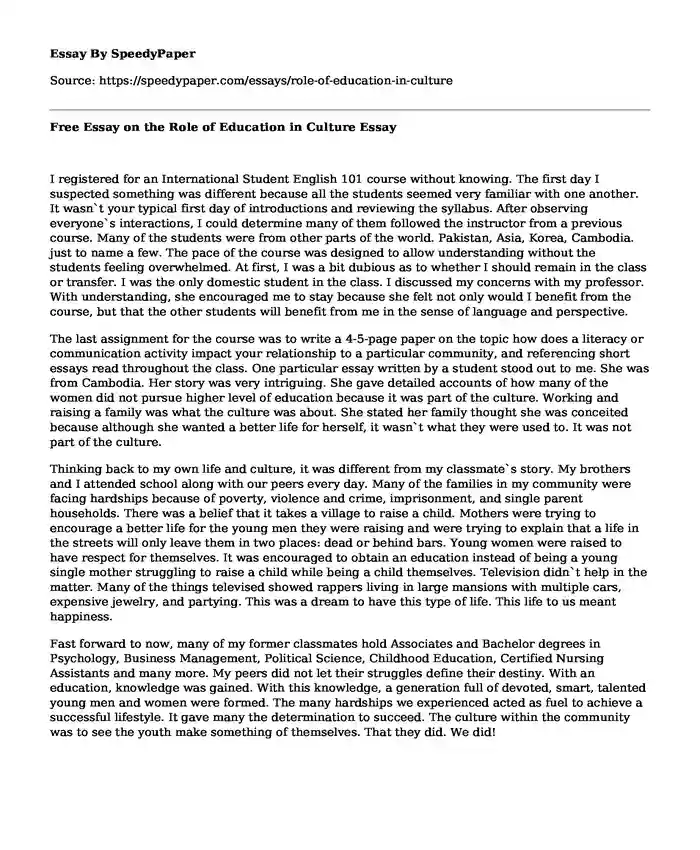I registered for an International Student English 101 course without knowing. The first day I suspected something was different because all the students seemed very familiar with one another. It wasn`t your typical first day of introductions and reviewing the syllabus. After observing everyone`s interactions, I could determine many of them followed the instructor from a previous course. Many of the students were from other parts of the world. Pakistan, Asia, Korea, Cambodia. just to name a few. The pace of the course was designed to allow understanding without the students feeling overwhelmed. At first, I was a bit dubious as to whether I should remain in the class or transfer. I was the only domestic student in the class. I discussed my concerns with my professor. With understanding, she encouraged me to stay because she felt not only would I benefit from the course, but that the other students will benefit from me in the sense of language and perspective.
The last assignment for the course was to write a 4-5-page paper on the topic how does a literacy or communication activity impact your relationship to a particular community, and referencing short essays read throughout the class. One particular essay written by a student stood out to me. She was from Cambodia. Her story was very intriguing. She gave detailed accounts of how many of the women did not pursue higher level of education because it was part of the culture. Working and raising a family was what the culture was about. She stated her family thought she was conceited because although she wanted a better life for herself, it wasn`t what they were used to. It was not part of the culture.
Thinking back to my own life and culture, it was different from my classmate`s story. My brothers and I attended school along with our peers every day. Many of the families in my community were facing hardships because of poverty, violence and crime, imprisonment, and single parent households. There was a belief that it takes a village to raise a child. Mothers were trying to encourage a better life for the young men they were raising and were trying to explain that a life in the streets will only leave them in two places: dead or behind bars. Young women were raised to have respect for themselves. It was encouraged to obtain an education instead of being a young single mother struggling to raise a child while being a child themselves. Television didn`t help in the matter. Many of the things televised showed rappers living in large mansions with multiple cars, expensive jewelry, and partying. This was a dream to have this type of life. This life to us meant happiness.
Fast forward to now, many of my former classmates hold Associates and Bachelor degrees in Psychology, Business Management, Political Science, Childhood Education, Certified Nursing Assistants and many more. My peers did not let their struggles define their destiny. With an education, knowledge was gained. With this knowledge, a generation full of devoted, smart, talented young men and women were formed. The many hardships we experienced acted as fuel to achieve a successful lifestyle. It gave many the determination to succeed. The culture within the community was to see the youth make something of themselves. That they did. We did!
Cite this page
Free Essay on the Role of Education in Culture. (2017, Jul 06). Retrieved from https://speedypaper.net/essays/role-of-education-in-culture
Request Removal
If you are the original author of this essay and no longer wish to have it published on the SpeedyPaper website, please click below to request its removal:
- Corporate Governance in the UK - Free Essay for Everyone
- What Are Your Career Goals Essay Sample
- Essay Sample on the Situation with the Starbucks Company Today
- Essay Example on the Presentation of the Community Option Program
- Free Essay Example on Drug Addiction Slavery
- Leadership Development Program - Free Essay Sample
- Free Essay: Policy Analysis on Social Security
Popular categories





